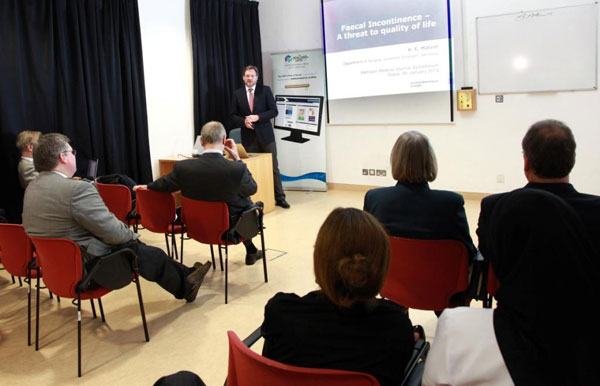On the sidelines of the Arab Health: Hamdan Medical Award supports the cooperation with Vienna University
29 January 2013
On the sidelines of the Arab Health Exhibition & conference which is being held in Dubai, Prof. Najib Al Khaja, Secretary General of Sheikh Hamdan Bin Rashid Al Maktoum Award for Medical Sciences, held a meeting with Professor Harald Rosen, Editor-in-Chief of the Award's Hamdan Medical Journal (HMJ), in the presence of Dr. Abdul Jabbar Mahdi, a member of the Editorial Board of the journal and Prof. Christoph Zielinski, Director of the clinical division of Oncology, University of Vienna. The meeting was held at the Seminar room of Dubai Medical College for girls, Rashid Hospital, Library Auditorium, to discuss the frameworks of the future mutual cooperation.
"The Award is proud of such cooperation with one of the most significant world academic institutions", Prof. Najib Al Khaja said after the conclusion of the educational program, organized by the HMJ in collaboration with a distinguished group of experts from University of Vienna. The program included eight specialized educational lectures attended by the editorial board of HMJ and a group of students from the Dubai Medical College.
"Supporting the continuing medical education and encouraging the medical publishing are two of the most important goals of Hamdan Medical Journal. The lectures have been recorded and they will be available on the web site of HMJ in order be viewed by the largest possible number of specialists", Al Khaja said.
As for the educational program, the 1st lecture was delivered by Prof. Christoph C. Zielinski, Director of the Clinical Division of Oncology, Vienna Medical University, Austria, during which he focused on novel therapeutics that are used to specifically block the pathways used by tumor cells to proliferate and thrive. He also explained the role played by certain mutations in components of these pathways leading to cells becoming refractory to cellular signals. Consequently these cells can divide uncontrollably which is the hallmark of cancer.
The 2nd lecture was delivered by Prof. Bernhard Ludvik, Associate Professor of Medicine, the Medical University of Vienna spoke about the newer medications that are used in the treatment of type2 diabetes, these agents target signaling pathways that play a role in the pathology of this disorder. This reflects the recent scientific success in terms of uncovering a myriad of molecular targets and markers that can help to identify disease predisposition and response to medication.
Dr. Anita Lawitschka, Pediatric Consultant at the St. Anna Children's Hospital in Vienna provided a comprehensive review of the late effects of allogenic stem cell transplantation and high dose chemo- and radiotherapy in children.
Then, Prof. Thomas Binder, a significant cardiologist, Vienna, spoke about the latest treatment strategies, using drugs and surgical methods, for the coronary artery diseases.
Also, Dr. Christian Kratzik, Associate Professor of Urology, Medical University of Vienna, explained the role of testosterone in developing metastatic prostate cancer. Dr. Kratzik focused on newer therapeutic approaches that can be used to deal with the tumors that had developed certain levels of resistance to therapy due to androgen-deprivation treatment.
During the 6th lecture, Prof. Engelbert Hanzal, Associate Professor, Department of Obstetrics and Gynecology, Medical University of Vienna, spoke about the latest technologies used in the treatment of Urinary Incontinence. He concentrated on the cutting-edge treatment techniques using the implantation of adult striated muscle stem-cells into the urethral sphincter.
Prof. Klaus Matzel, Head of the Section of Coloproctology, the University Erlangen, Germany, gave a detailed account of the latest therapeutic approaches in relation to treating fecal incontinence. Most importantly, Prof. Matzel introduced functional rehabilitation by electrical stimulation of the peripheral nerve supply of the continence organ.
Finally, Mrs. Pippa Smart, consultant, Hamdan Medical Journal, delivered a lecture on the principles of editing the medical research papers, the standards of selecting a medical journal beside the importance of following up the published medical articles by authors.

